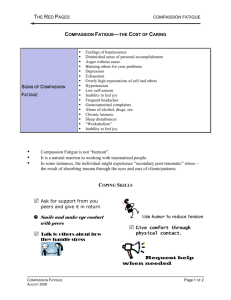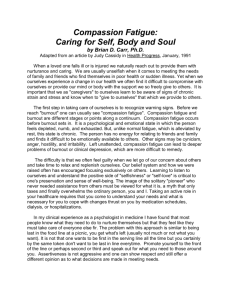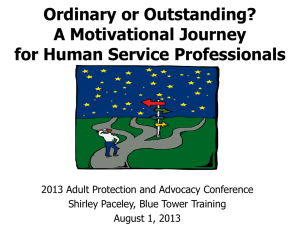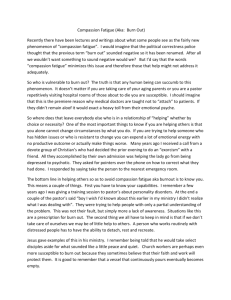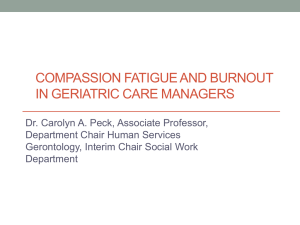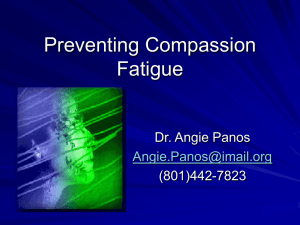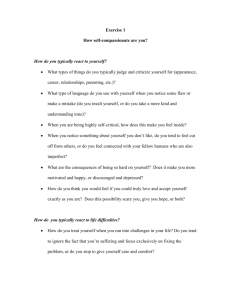Making Work Work
advertisement
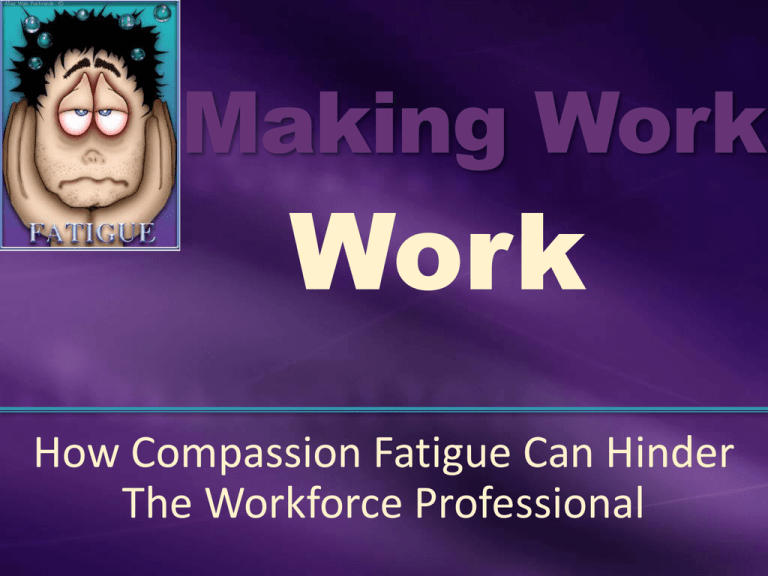
Making Work Work How Compassion Fatigue Can Hinder The Workforce Professional Burnout Secondary Traumatic Stress (STS) Compassion Fatigue (CF) Chronic Vicarious Exposure Stress Hardiness Helper’s High Energy Vampires Compassion Satisfaction (CS) Compassion Fatigue The result of an individual experiencing both burnout and secondary trauma Burnout Secondary Trauma Compassion Fatigue Burnout Stress related to the job environment in which we work as well as the job requirements Excessive Paperwork Long Hours Difficult Customers Secondary Traumatic Stress The reaction to dealing with other’s situations •Secondary Victimization •Secondary Traumatization •Secondary Survivor Whose Stuff is This? Compassion Fatigue Occupational exhaustion associated with deep physical, emotional, and spiritual giving The inability to feel compassion or the gradual lessening of compassion that exists overtime For some, Compassion Fatigue is also the clash between their current reality and their past expectations Reality Expectations Professions that nurture the growth of or address the problems of a person's physical, psychological, intellectual, emotional, or spiritual well-being Workforce Professionals are Helping Professionals Therefore Prone to Burnout and Compassion Fatigue Who Do We Help? How Do We Help Them? Teaching to Prevent Burnout in the Helping Professions by Debra Damn “Watching talented and even gifted colleagues struggle with emotional exhaustion and coping through cynicism becomes taxing to the morale of all helping professionals.” Careerbuilder.com Burnout Survey 23% Workers That Feel Burned Out On The Job Workers That Do Not Feel Burned Out On The Job 77% Most people who choose helping professions are usually burned out or fatigued prior to entering the field People that are attracted to helping professions… Are Natural Nurturers May come from dysfunctional homes or backgrounds Have a strong identification with the helpless and suffering Were taught early to care for the needs of others Seek a Helper’s High Helper’s High A euphoric feeling followed by a period of calm, experienced after performing a kind act The physical sensation results from the release of endorphins Individual feels an improved emotional well-being and a sense of self-worth These feelings reduce stress and improve the health of the helper Unfulfilled Expectations-Reality Hits My Professor Did Not Tell Me This! Institutional Stress Information Overload Chronic Vicarious Exposure Via Media Via Customers High degree of responsibility High degree of paper work Demanding caseloads Cubicle Setting Little Privacy Daily crisis Long hours My Professor Did Not Tell Me This Institutional Stress Keeping your work space clean Only 5 personal items allowed No offensive material Welcome to the Cubicles! Only managers get offices Please eat in the break room I thought we could wear jeans on FRIDAYS! My Professor Did Not Tell Me This Lack of Appreciation That’s Your Job! Time & Attendance But I always work late… Networking & Competition Office Politics Due Process Remembering Passwords Learning Local Operating Procedures Learning Program Standard Operating Procedures Getting To Know Your Customers and Their Story Learning Different Management Information Systems We are all socio-biologically connected I feel your pain… Helper’s High-Joy from Helping Others Energy Vampires- Drain Your Energy Overexposure to problems that are continuous and irresolvable Desensitizes individuals Causes a lack of responsiveness From Our Customers Participation Pushback Not attending scheduled activities Not following through with career plans Difficult Interaction Angry or Defensive Physical or Verbal aggression Repeated Disappointments Exhausting benefits prior to reaching self-sufficiency Not taking advantage of available resources and referrals Job Abandonment From the Media Exploitation of Disadvantaged Populations Homeless Unemployed Needy Exploitation of Vulnerable People Victims of Trauma Domestic/Sexual Violence Child Abuse Psychologically Anxiety Depression Hyper vigilance Over protectiveness Biologically Ulcers Inability to sleep Decreased energy Headaches/migraines Aggravated pre-existing conditions Individual May Appear Cynical Isolated Negative Withdrawn Unproductive Easily Agitated Highly Critical Inflexible Defensive Unfocused Individual May Feel Inadequate Incompetent Helplessness Hopelessness Powerlessness Overwhelmed A diminished desire to help people Organizational Symptoms of CF Diffusion of Responsibility Some One Else’s Problem (SEP) Allows things to happen in a group that would not allow if the individual were alone Bystander Effect The more people around the less likely anyone will do anything Group Think Conformity releases the individual from responsibility How Does the Region Suffer? High turnover rates Chronic Absenteeism Lack of a vision for the future Spiraling worker's comp costs Strong reluctance toward change Negativism towards management Unstable co-worker relationships Horizontal Violence or Aggression Lack of flexibility among staff members Inability for teams to work well together Inability of staff to respect and meet deadlines Inability of staff to believe improvement is possible Stress-Hardy Personality Personality traits within some individuals that allow them to be more resistant and better protected from the effects of stress than others Stress-Hardy Personality Traits Commitment Control Challenge Commitment When individuals are committed to something they tend to be more motivated and willing to put in more effort Control The amount of control that we feel we have over a stressor determines how difficult it will be for us to cope with it Challenge Stressful events are seen as challenges instead of threats and the individual is able to accept that change is inevitable Individuals must learn how to… Control the way they respond to challenges More Confidently Less Destructively Destructive Stress Responses Emotional Eating-Not Eating Verbal or Physical Aggression Self-Defeating Language Throwing in the Towel Initiating Workplace Conflict Defiance-Insubordination Team Work Makes the Dream Work Create a positive and supportive environment for teams to work in Provide opportunities for team members to discuss their stress Lower the caseload number per team member Allow team members to split-up or rotate difficult caseloads Create teambuilding and socialization activities to increase trust and cohesion amongst team members Encourage Self-Care & Positive Stress Responses Healthy Habits Good Nutrition Sleep Exercises Work Breaks Educate Causes of Compassion Fatigue Effects of Compassion Fatigue How to Combat Compassion Fatigue Healing an organization takes… Time Patience Commitment Management must be aware of Compassion Fatigue and the effect it is having on staff A healthier workforce will lead to better client outcomes and lower staff turnover Reconnect & Align Your Purpose Program Purpose Your purpose-Why are YOU here Program Purpose-Why are WE here Specific-Measureable-Attainable-Reasonable-Time Targeted Set Goals Things I want to accomplish in my life Things I want to change about my life Minimize Exposure Go Home! Turn the TV Off Change The Topic Make New Friends Leave Work At Work Use Your Vacation Time More Productive After Vacation Less Productive After Vacation 460 Million Lost Vacation Days Participate in Pleasurable Experiences Legal! No Helping Highs! Save Yourself Compassion Fatigue Compassion Satisfaction Websites, Articles, & Books Whose Stuff is This by Yvonne Perry To Weep For a Stranger by Patricia Smith Heart at Work www.barbarababkirk.com Compassion Fatigue www.socialworker.com Traumatology Journal www.tmt.sagepub.com Compassion Fatigue in the Helping Professions www.familystressencyclopedia.blogspot.com Treating Compassion Fatigue by Charles Figley Stress Hardiness www.stresscourse.tripod.com Compassion Fatigue Self Test www.compassionfatigue.org Vacations Benefit Both Worker and Boss www.businessmainetoday.com For More Resources Please Email Nikki Brown nikki.brown@deo.myflorida.com An equal opportunity employer/program. Auxiliary aids and services are available upon request to individuals with disabilities. All voice telephone numbers on this document may be reached by persons using TTY/TDD equipment via Florida Relay Service at 711.
